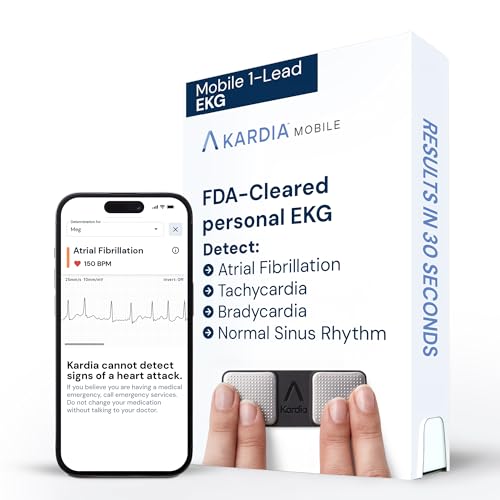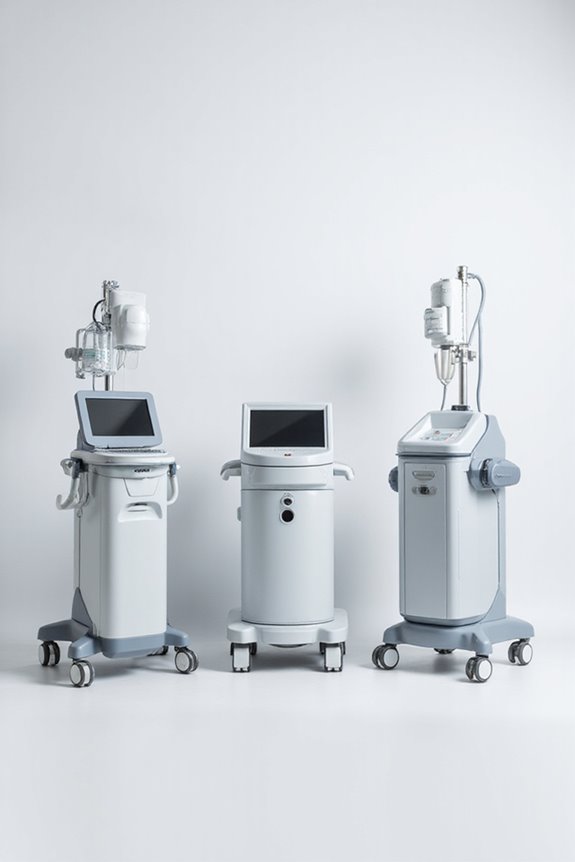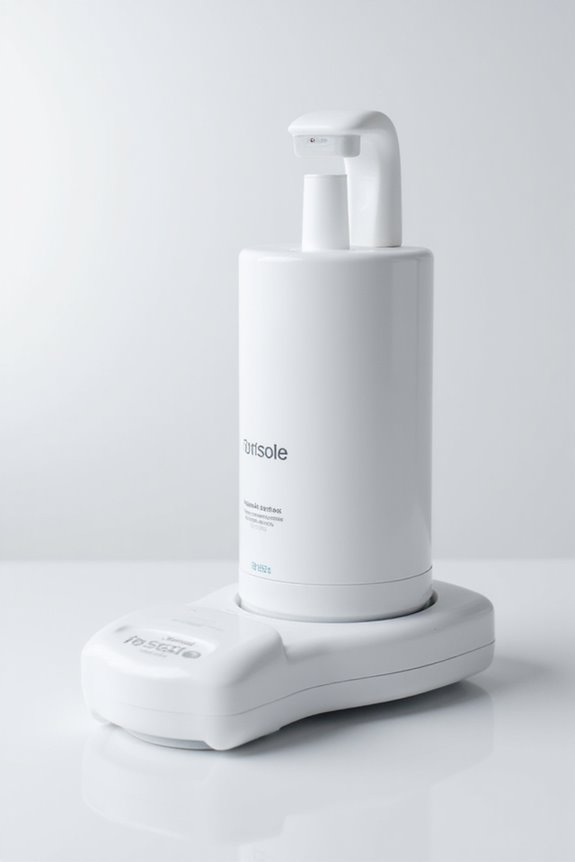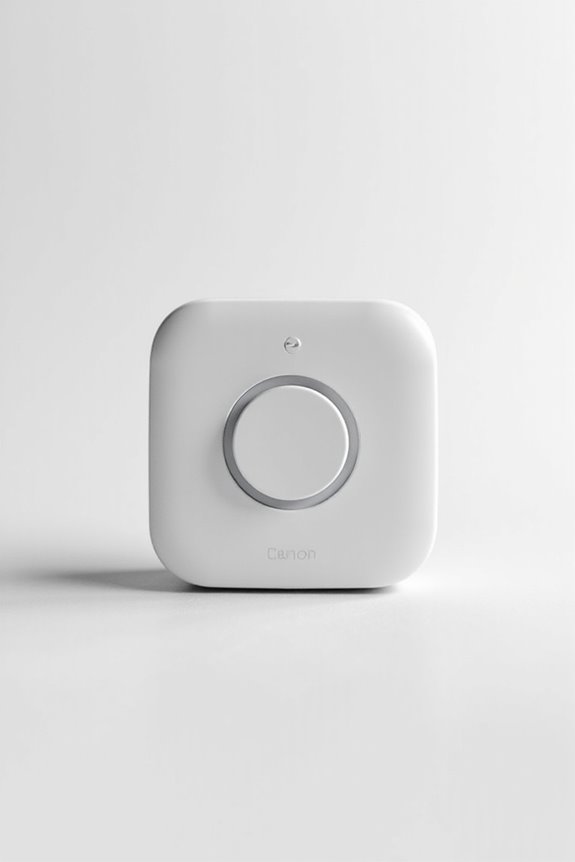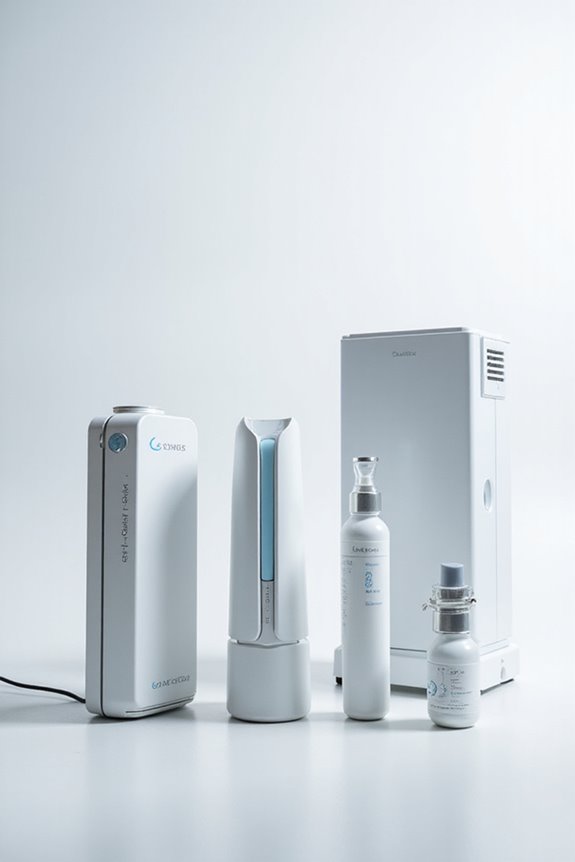As an Amazon Associate, we earn from qualifying purchases. Some links may be affiliate links at no extra cost to you. Although our opinions are based on curated research, we haven't used these products. Articles generated with AI.
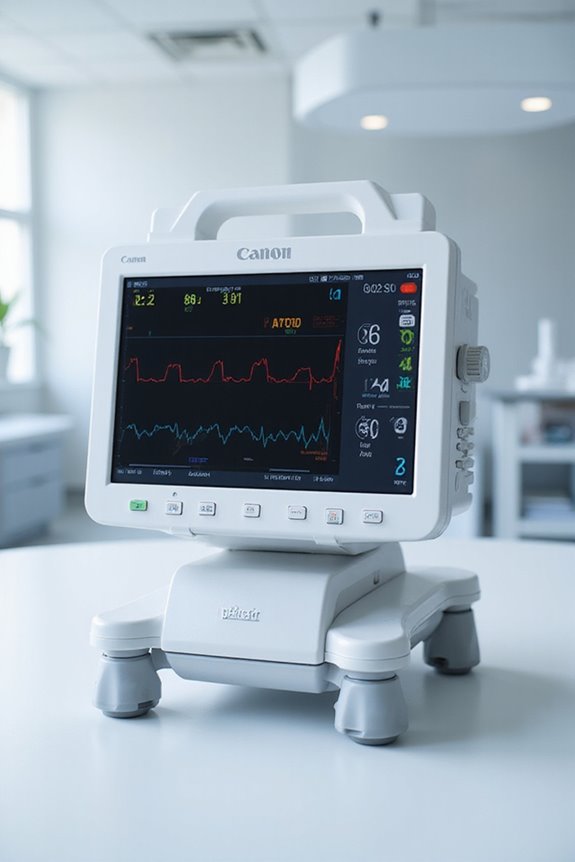
The 5 Best Electronic Heart Monitors of 2025 – Your Guide to Heart Health
The top electronic heart monitors of 2025 include:
- KardiaMobile: Records EKGs in 30 seconds; FDA-cleared.
- Smart Watch Health Tracker: 24/7 heart rate monitoring; tracks sleep stages.
- Smart Watch Fitness Tracker: Bluetooth calling; monitors multiple health metrics.
- Garmin HRM-Dual: Long battery life; dual connectivity options.
- Garmin HRM Pro Plus: Real-time data; excellent accuracy for workouts.
These monitors offer essential features for managing heart health effectively. To find out more important details, keep exploring.
Key Takeaways
- The KardiaMobile is acclaimed for its compact design and ability to deliver medical-grade EKGs in just 30 seconds, making it highly portable.
- Smart wearable fitness trackers continuously monitor heart rate, blood pressure, and SpO2, offering comprehensive health tracking throughout the day.
- Garmin’s HRM-Dual features a soft strap and excellent battery life, ensuring comfort and longevity without frequent replacements.
- ECG monitors, such as the KardiaMobile, provide more precise data than PPG monitors, making them superior for accurate heart health tracking.
- User-friendly interfaces and real-time data access on smartphones ensure effortless monitoring and interpretation of heart health metrics.
KardiaMobile Personal EKG Monitor
KardiaMobile 1-Lead EKG Monitor, Medical-Grade FDA-Cleared Personal Heart Monitor, Detects Normal,...
- On-the-Go Accurate EKG: Capture a single lead medical-grade electrocardiogram in just 30 seconds with the pocket-sized KardiaMobile EKG Monitor. Download the free Kardia...
- Clear Results: EKG detects Atrial Fibrillation, Tachycardia, Bradycardia and Normal Sinus Rhythm and displays easy-to-read result. Email EKG to your doctor or anyone. Add...
- Simple to Use Without a Subscription: No Bluetooth, Wi-Fi, cords or PC needed. Place the device near your smartphone. Monitor your heart by placing your fingers or thumbs...
The KardiaMobile 1-Lead Personal EKG Monitor is an ideal choice for individuals seeking a reliable and portable solution to monitor their heart’s electrical activity.
Key Features:
- Functionality: Records medical-grade EKGs in just 30 seconds; detects Atrial Fibrillation, Bradycardia, Tachycardia, and Normal Sinus Rhythm.
- Portability: Compact design fits in your pocket; compatible with most smartphones and tablets.
- FDA Clearance: FDA-cleared and doctor-recommended, with over 100 million EKGs recorded.
User Experience:
- Operation: Simply place fingers on sensors for instant results.
- EKG History: Easily email your EKGs to doctors or save on your phone; no subscription required for basic functionalities.
Best For: Individuals seeking a convenient and efficient way to monitor their heart health via a portable EKG device.
Pros:
- Easy to use with instant results available on your smartphone.
- Compact design allows for portability and convenience in everyday use.
- FDA-cleared and widely recommended by healthcare professionals, ensuring reliability.
Cons:
- Not suitable for diagnosing serious conditions like heart attacks or coronary artery disease.
- Lacks the comprehensive analysis of a 12-lead EKG, limiting its use in emergencies.
- Premium subscription for additional features may be considered expensive for casual users.
Smart Watch Health Fitness Tracker with 24/7 Heart Rate Monitor
For individuals seeking thorough health monitoring and activity tracking, the Smart Watch Health Fitness Tracker with 24/7 heart rate monitor stands out as an essential device.
Health Monitoring Features
- 24/7 heart rate, blood oxygen, and blood pressure monitoring.
- Detailed sleep tracker identifies REM, light, and deep sleep stages.
- Access real-time health metrics on your wrist, with full data available via the app.
Activity Tracking
- Tracks over 115 sports modes, providing advanced metrics.
- Monitors daily steps, distance, and calories burned with GPS connectivity.
Notifications
– Receive calls, texts, and email notifications directly on the watch.
Design and Usability
– Features a 1.47-inch HD touchscreen and IP68 waterproof rating.
Battery Life
– Lasts 6-7 days on heavy use; standby time up to 30 days.
Best For: Individuals who want comprehensive health monitoring and activity tracking in a stylish, user-friendly smart watch.
Pros:
- 24/7 health monitoring capabilities including heart rate, blood oxygen, and blood pressure tracking.
- Over 115 sports modes catering to various fitness activities, complete with GPS functionality.
- Long battery life lasting 6-7 days on heavy use, with a standby time of up to 30 days.
Cons:
- Requires smartphone connectivity for certain features like GPS tracking and real-time notifications.
- May not be suitable for extensive diving due to IP68 rating limitations.
- Customization options for watch faces may be limited compared to other smart watches on the market.
Smart Watch Fitness Tracker with Heart Rate and Sleep Monitor
Smart Watch Fitness Tracker (Answer/Make Call), 24/7 Heart Rate Spo2 Blood Pressure Monitor Sleep...
- 【Bluetooth Calls & Messages Notifications】You can easily make/answer calls, store contacts and view call history on the fitness watch with just one Bluetooth...
- 【24H Accurate Health Monitoring】Smart watches for women adopt advanced sensors to accurately monitor your 24/7 blood oxygen, blood pressure and heart rate. Smart...
- 【114+ Sports Modes & All-Day Activity Tracking】Smart watches monitor your steps, distance and calories burned all the day to help you achieve your fitness goals more...
Smart Watch Fitness Tracker with Heart Rate and Sleep Monitor stands out as an ideal choice for active individuals seeking thorough health monitoring.
Key Features:
- Notifications: Enables Bluetooth calls and messages, allowing you to make/answer calls and view call history.
- Display: 1.57 HD bright color display for easy readability.
- Activity Tracking: Supports 114+ sports modes for detailed tracking of steps, distance, and calories.
- Health Monitoring: Offers 24/7 monitoring of heart rate, SpO2, and blood pressure.
Battery Life and Durability:
- Battery: 230mAh battery lasts 3-7 days with heavy use; up to 30 days on standby.
- Water-Resistant: IP67 rating protects against splashes and sweat.
Customization:
– Over 150 customizable watch faces available.
Support:
– 30-day free return policy and 1-year warranty.
Best For: Active individuals seeking comprehensive health monitoring along with convenient call and message notifications.
Pros:
- Supports 114+ sports modes for detailed tracking of various activities.
- 24/7 accurate health monitoring including heart rate, SpO2, and blood pressure.
- Customizable watch faces with over 150 options available for personalization.
Cons:
- Battery life may decrease with extensive use of notifications and features.
- Limited to IP67 waterproofing, which may not be sufficient for swimming.
- Some users may find the watch bulkier than traditional fitness trackers.
Garmin 010-12883-00 HRM-Dual Heart Rate Monitor
Garmin HRM-Dual Heart Rate Monitor, Black - 010-12883-00
- HRM dual features a soft strap that is comfortable and adjustable
- Simply remove the heart rate module, and it’s washable, too
- Don’t worry about running out of juice
Garmin 010-12883-00 HRM-Dual Heart Rate Monitor stands out as a top choice for fitness enthusiasts seeking reliable heart rate monitoring.
Key Features
- Comfort: Soft, adjustable strap; washable material.
- Connectivity: Dual Bluetooth signals and ANT+ support.
- Compatibility: Works with smartphones, spin bikes, rowing machines, and more.
Performance
- Battery Life: Up to 3.5 years with user-replaceable CR2032 battery.
- User Ratings: 4.1 out of 5 stars from over 23,000 ratings.
Conclusion
This monitor’s durability and compatibility enhance its value, making it a preferred option over competitor products.
Best For: Fitness enthusiasts who desire an accurate and reliable heart rate monitor for various activities.
Pros:
- Comfortable and adjustable strap for a secure fit during workouts.
- Long battery life of up to 3.5 years with a user-replaceable battery.
- Wide compatibility with multiple devices, including smartphones and gym equipment.
Cons:
- The strap’s closure mechanism may wear over time.
- Strong signal could inadvertently sync with nearby devices.
- Some users may find the initial setup process a bit challenging.
Garmin HRM Pro Plus
Garmin HRM-Pro Plus, Premium Chest Strap Heart Rate Monitor, Captures Running Dynamics, Transmits...
- Premium heart rate strap transmits accurate real-time heart rate and heart rate variability data via ANT plus technology and BLUETOOTH Low Energy technology to Garmin...
- Captures running dynamics, such as vertical oscillation, ground contact time, stride length, vertical ratio and more to help improve your form and enable running power on...
- Computes pace and distance for treadmill or indoor track workouts
The Garmin HRM Pro Plus heart rate monitor is an ideal choice for serious athletes seeking precise training data.
Compatibility
- Transmits real-time heart rate via ANT+ and Bluetooth Low Energy.
- Compatible with various Garmin devices, fitness equipment, and the Tacx Training app.
Advanced Features
- Captures running dynamics like vertical oscillation and ground contact time.
- Stores heart rate data during swimming and syncs via Garmin Connect.
Performance
- Noted for excellent accuracy during intense workouts.
- Comfortable for long sessions; battery lasts over a year.
User Experience
- Quick connection and reliable performance reported.
- Requires a Garmin smartwatch for full functionality.
Best For: The Garmin HRM Pro Plus is best for serious athletes who require precise heart rate and performance data for optimizing their training.
Pros:
- Transmits accurate real-time heart rate data via dual connectivity (ANT+ and Bluetooth).
- Comfortable for extended wear, making it suitable for long workouts.
- Features advanced metrics such as running dynamics and syncs data seamlessly with Garmin devices.
Cons:
- Users may experience pairing issues with certain devices.
- Full functionality often requires a compatible Garmin smartwatch.
- Some users prefer heart rate monitors from other brands over this model.
Factors to Consider When Choosing an Electronic Heart Monitor
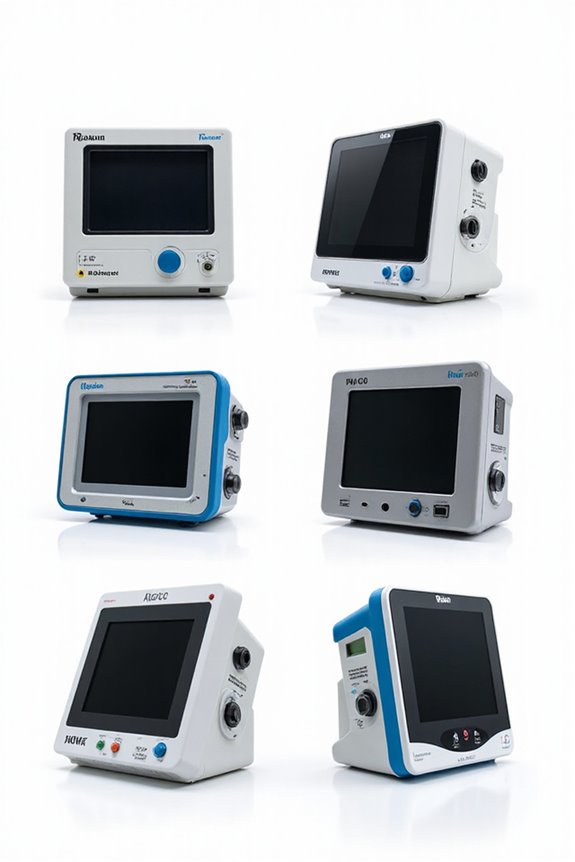
When choosing an electronic heart monitor, you’ll want to focus on several critical factors. Monitoring accuracy is essential to guarantee reliable data, while device compatibility ensures seamless integration with your other gadgets. Additionally, consider user-friendliness, battery life, and health tracking features to enhance your overall experience.
Monitoring Accuracy
Monitoring accuracy is vital for evaluating heart health, especially as various factors can considerably influence the reliability of readings.
- Sensor Type: ECG monitors typically offer more precise data than PPG monitors.
- Placement: Chest-mounted monitors generally provide better accuracy than wrist placement, especially during vigorous activity.
- Calibration: Devices that calibrate well and connect with multiple devices often reduce signal interference, enhancing accuracy.
- External Factors: User movement, sweat, and skin temperature can affect readings. Some devices feature designs that minimize these issues.
- Updates: Regular software and firmware updates are critical, as they implement the latest algorithms to improve overall monitoring precision.
Consider these aspects to guarantee the heart monitor you choose provides reliable and accurate readings.
Device Compatibility
Guaranteeing device compatibility is essential for maximizing the functionality of your electronic heart monitor. When selecting a device, consider the following factors:
- Connectivity Options: Some monitors connect solely via Bluetooth or ANT+. Confirm that your smartphone or tablet supports these technologies.
- Dual Connectivity: Look for heart monitors with dual connectivity options to sync with multiple devices simultaneously, facilitating versatile tracking.
- App Exclusivity: Some devices require specific proprietary apps for functionality. Verify these apps are available for your operating system.
- Third-Party Integration: Check if the monitor allows data transfer to third-party health and fitness applications for enhanced tracking capabilities.
- Data Storage: Confirm your monitor can store data when out of range, allowing continuous tracking during activities like swimming or outdoor workouts.
User-Friendliness
How easily can you use your electronic heart monitor?
User-friendliness is vital when selecting a heart monitor. Consider these factors:
- Setup and Operation: Devices should require simple app downloads and quick account creation for efficient functionality.
- Instant Access to Results: Opt for monitors that provide real-time heart rate data or EKG readings on your smartphone.
- Compatibility: Verify the device seamlessly integrates with your smartphone or tablet for tracking health metrics.
- Intuitive Interface: A clear display and easy navigation are fundamental for understanding health data without confusion.
- Support Availability: Look for tutorials and customer support within the app, which enhances user experience by assisting with troubleshooting and feature utilization.
Choose wisely for ideal heart health tracking.
Battery Life
Battery life is a significant aspect when evaluating electronic heart monitors. A longer battery life allows you to minimize recharging or replacements, enhancing your convenience. Consider the following factors:
- Duration: Some monitors last over a year, while others may only last a few days to weeks. Choose based on your intended usage.
- User-replaceable batteries: Devices with user-replaceable batteries eliminate the need for specialized services, allowing for easy battery changes.
- Low power consumption: This feature can extend operational time, guaranteeing uninterrupted monitoring.
- Charging time: Assess the charging duration; quicker charging capabilities improve usability for frequent heart rate checks.
Evaluating these elements will guarantee that you select a monitor that fits your lifestyle and needs effectively.
Health Tracking Features
When selecting an electronic heart monitor, health tracking features play an essential role in your overall assessment.
- 24/7 Heart Rate Monitoring: Continuous tracking enables you to monitor fluctuations throughout the day and night.
- Advanced Health Metrics: Look for features like blood oxygen saturation (SpO2) and blood pressure monitoring for a thorough cardiovascular overview.
- Sleep Tracking: Analyze sleep quality, including time spent in different sleep stages, to support overall health.
- Multiple Sports Modes: Confirm compatibility with various physical activities for detailed performance insights.
- Data Syncing with Apps: Choose monitors that sync wirelessly with mobile apps for real-time data analysis and historical tracking, enhancing your health management experience.
These features collectively assist in making informed health decisions.
Connectivity Options
Connectivity options are an important factor to take into account when choosing an electronic heart monitor, as they directly impact data transmission and usability. Here are key considerations:
- Types of Connectivity: Look for Bluetooth and ANT+, which enable real-time data transfer to smartphones and compatible devices.
- Dual Bluetooth Connectivity: This feature allows stable connections and simultaneous pairing with multiple devices, enhancing workout usability.
- ANT+ Compatibility: Confirm the monitor works with a variety of fitness equipment for seamless gym experiences.
- Data Storage: Check if the monitor can store data when out of range and sync with companion apps for thorough tracking.
- Connection Stability: Reliable connectivity is vital for accurate heart rate monitoring, so evaluate set-up ease and connection stability.
Design and Portability
Design and portability are crucial factors to ponder when selecting an electronic heart monitor. Here are essential elements to take into account:
- Portability: Compact designs easily fit in your pocket, ideal for on-the-go use.
- Weight: Lightweight models, typically around 18 grams or less, guarantee comfort for extended wear.
- Profile: Slim profiles prevent interference with daily activities, offering an unobtrusive experience.
- Water Resistance: Ratings like IP67 or IP68 suit users engaging in aquatic activities or encountering moisture.
- Customization: Look for devices with customizable watch faces and adjustable straps, enhancing comfort and personal touch.
Evaluating these factors will help you choose a heart monitor that fits seamlessly into your lifestyle while effectively monitoring your heart health.
Frequently Asked Questions
How Often Should I Use My Heart Monitor for Best Results?
To optimize your heart monitor’s effectiveness, aim for consistent usage.
- Daily Tracking: Monitoring your heart daily can provide critical insights into your health.
- Exercise and Rest: Use it during workouts for peak performance analysis, and also at rest to track recovery.
- Health Changes: If health changes arise, increased monitoring frequency is advisable.
Regular data collection enhances accuracy, ensuring you stay informed about your heart’s behavior and overall well-being.
Can Electronic Heart Monitors Detect Irregular Heart Rhythms?
Yes, electronic heart monitors can detect irregular heart rhythms, also known as arrhythmias.
- Functionality: They use sensors to measure heart rate and rhythm.
- Data: Many models provide real-time monitoring and alert you to anomalies.
- Accuracy: Studies indicate over 90% accuracy in detecting specific arrhythmias.
Regular use can enhance the monitoring of your heart health, leading to timely interventions and better management of potential cardiovascular issues.
Are Heart Monitors Safe for All Ages?
Heart monitors can be safe for all ages but require careful consideration.
- Infants and Children: Monitors may be used under medical supervision.
- Adults: Generally safe for home use.
- Elderly: Consider individual health status and potential vulnerabilities.
Always consult with a healthcare professional before use to guarantee safety and effectiveness. Each device varies in design, so user-specific monitoring options exist.
Do I Need a Prescription to Buy a Heart Monitor?
You don’t necessarily need a prescription to buy a heart monitor. Many over-the-counter options are available for personal use. However, if you’re seeking advanced or specific models, a healthcare provider may recommend one.
Key Points:
- Over-the-counter options are generally accessible.
- Prescription may be required for medical-grade monitors.
- Consult your healthcare provider for tailored advice.
Such guidance guarantees you select the appropriate device for your needs.
How Do Heart Monitors Connect to Smartphones or Apps?
Heart monitors connect to smartphones or apps through Bluetooth or Wi-Fi technology, facilitating real-time data transmission.
- Compatibility: Confirm your device is compatible with your smartphone’s operating system.
- Settings: Follow the manufacturer’s instructions to pair devices; typically, this involves enabling Bluetooth or accessing the app.
- Monitoring: Once connected, you can track heart rate, rhythm, and other crucial metrics instantly.
This integration enhances your ability to manage heart health effectively.

